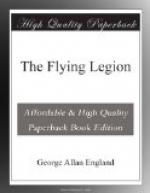Suddenly the Master of Niss’rosh came to a decision. He returned, clapped his hands thrice, sharply, and waited. Almost at once a door opened at the southeast corner of the room—where the observatory connected with the stairway leading down to the Master’s apartment on the top floor of the building—and a vague figure of a man appeared.
The light was steadily fading, so that this man could by no means be clearly distinguished. But one could see that he wore clothing quite as conventional as his master’s. Still, no more than the Master did he appear one of life’s commonplaces. Lean, brown, dry, with a hawk-nose and glinting eyes, surely he had come from far, strange places.
“Rrisa!” the Master spoke sharply, flinging the man’s name at him with the exasperation of overtensed nerves.
“M’alme?” (Master?) replied the other.
“Bring the evening food and drink,” commanded the Master, in excellent Arabic, guttural and elusive with strange hiatuses of breath.
Rrisa withdrew, salaaming. His master turned toward the western windows. There the white blankness of the map of Arabia seemed mocking him. The Master’s eyes grew hard; he raised his fist against the map, and smote it hard. Then once more he fell to pacing; and as he walked that weary space, up and down, he muttered to himself with words we cannot understand.
After a certain time, Rrisa came silently back, sliding into the soft dusk of that room almost like a wraith. He bore a silver tray with a hook-nosed coffee-pot of chased metal. The cover of this coffee-pot rose into a tall, minaret-like spike. On the tray stood also a small cup having no handle; a dish of dates; a few wafers made of the Arabian cereal called temmin; and a little bowl of khat leaves.
“M’alme, al khat aja” (the khat has come), said Rrisa.
He placed the tray on the table at his master’s side, and was about to withdraw when the other stayed him with raised hand.
“Tell me, Rrisa,” he commanded, still speaking in Arabic, “where wert thou born? Show thou me, on that map.”
The Arab hesitated a moment, squinting by the dim light that now had faded to purple dusk. Then he advanced a thin forefinger, and laid it on a spot that might have indicated perhaps three hundred miles southeast of Mecca. No name was written on the map, there.
“How dost thou name that place, Rrisa?” demanded the Master.
“I cannot say, Master,” answered the Arab, very gravely. As he stood there facing the western afterglow, the profound impassivity of his expression—a look that seemed to scorn all this infidel civilization of an upstart race—grew deeper.
To nothing of it all did he owe allegiance, save to the Master himself—the Master who had saved him in the thick of the Gallipoli inferno. Captured by the Turks there, certain death had awaited him and shameful death, as a rebel against the Sublime Porte. The Master had rescued him, and taken thereby a scar that would go with him to the grave; but that, now, does not concern our tale. Only we say again that Rrisa’s life lay always in the hands of this man, to do with as he would.




